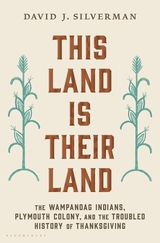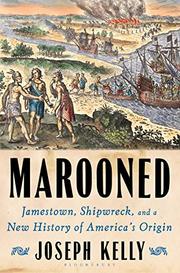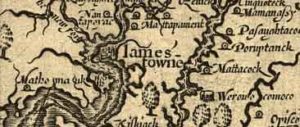David J. Silverman: This Land is Their Land: The Wampanoag Indians, Plymouth Colony, and the Troubled History of Thanksgiving
March 11, 2020 by David
Filed under Non-Fiction, WritersCast
 This Land is Their Land: The Wampanoag Indians, Plymouth Colony, and the Troubled History of Thanksgiving – David J. Silverman – Bloomsbury – Hardcover – 9781632869241- 528 pages – $32.00 – November 5, 2019 – ebook versions available at lower prices
This Land is Their Land: The Wampanoag Indians, Plymouth Colony, and the Troubled History of Thanksgiving – David J. Silverman – Bloomsbury – Hardcover – 9781632869241- 528 pages – $32.00 – November 5, 2019 – ebook versions available at lower prices
There have been a number of books I have read recently (and another I am reading now) that both challenge and retell the founding myths that power America’s beliefs about itself. In particular, I find books like David Silverman’s extraordinary work of historical storytelling, grounded in deep research and a new perspective so powerful, because they make us question and rethink stories and beliefs about ourselves we have come to take for granted.
Every culture tells its creation myths, establishing core values through historical story telling, that help shape the shared belief systems of the people who make up that culture. American creation myths tell stories that train our citizens to believe in the essential rightness of European settlement of the “virgin” territory now known as the United States to overlook not only the invasion and displacement of indigenous peoples, but to justify the way those peoples have been cast and treated subsequently by the dominant culture.
One of the most powerful of all historical American myths is that of the Pilgrims’ arrival in what is now called Plymouth, Massachusetts. The people who then lived along the eastern coast of America were primarily the loosely confederated Wampanoags, a tribal group that controlled most of what is now coastal Massachusetts and Rhode Island.
That creation story suggests that the Pilgrims were the first white people the Wampanoags met, and greeted them with open arms and friendship. In fact, by the time the Pilgrims landed on their shores, the Wampanoags had over 100 years’ experience with Europeans, including fishermen and explorers, and they had just gone through a horrendous five year period wracked by European diseases against which they had no anti-bodies, and their population and culture had been devastated. The Wampanoags, led by their sachem, Ousamequin (Massasoit), greeted this new group of visitors with a deep knowledge and understanding of who these newcomers were and what they might want. And they also had an extremely clear idea of how the Europeans could be positioned to help the Wampanoags in their ongoing territorial struggles with neighboring Massachusetts peoples, and other more distant tribes who frequently attacked them. Europeans came with guns and tools they would reasonably expect to trade with indigenous people in return for food and furs.
In March 1621, Ousamequin and the Plymouth colony’s governor, John Carver, agreed on their friendship and made an active commitment to mutual defense. That fall, the English, with the help of the Wampanoag, made their first successful harvest in their “New World.” When Ousamequin and some of his tribe visited Plymouth, they also helped create the “First Thanksgiving.” And the treaty made between the Wampanoags and the English remained functional, despite much friction and miscommunication between the two cultures, for more than fifty years, until King Philip’s War in 1675, when peace ended, and Wampanoags lost most of their power and land.
The relationship between Wampanoags and Europeans, then Americans, did not end, however, in the seventeenth century. The Wampanoags survived and have retained their culture against tremendous odds. In this book, historian David J. Silverman illuminates this long, fraught, and difficult relationship, even to modern times, from the perspective of the indigenous people, providing us with a powerfully different view of our history than we typically experience.
The story of the Wampanoags, who were among the earliest tribes in conflict with the European invaders, is one that was repeated many times across hundreds of years, with other tribes elsewhere across the North American continent. What the Wampanoags experienced through the last several centuries is a story that can help us all understand a truer picture of our country’s history, one we should all aim to better comprehend. And with a different perspective about our past, perhaps we will be able to create a better present for us all.
“David Silverman has crafted a gripping Native-centered narrative of the English invasion of New England. Finally, there is a book that vividly contextualizes the fabled first Thanksgiving, placing Native diplomacy and actions at the very center of the story, along with the warfare, dispossession, and struggle for sovereignty that was very much part of the longer aftermath of first contact. It is a story that continues into the present and a must read for every American.” – Linford Fisher, author of THE INDIAN GREAT AWAKENING
David J. Silverman is a professor at George Washington University, where he specializes in Native American, Colonial American, and American racial history. He is the author of Thundersticks, Red Brethren, Ninigret, and Faith and Boundaries. His essays have won major awards from the Omohundro Institute of Early American History and Culture and the New York Academy of History.
It was my great pleasure to speak with David Silverman about This Land is Their Land.
You can buy the book from RJ Julia Booksellers in Madison, Connecticut – they will deliver! Click here to purchase.
Podcast: Play in new window | Download
Joseph Kelly: Marooned: Jamestown, Shipwreck, and a New History of America’s Origin
March 18, 2019 by David
Filed under Non-Fiction, WritersCast
 Marooned: Jamestown, Shipwreck, and a New History of America’s Origin – Jospeh Kelly – 978-1-63286-777-3 – Bloomsbury – Hardcover – 512 pages – $32 – October 30, 2018 – ebook versions available at lower prices
Marooned: Jamestown, Shipwreck, and a New History of America’s Origin – Jospeh Kelly – 978-1-63286-777-3 – Bloomsbury – Hardcover – 512 pages – $32 – October 30, 2018 – ebook versions available at lower prices
I really enjoy reading books about American history, and especially lately, books that explore some of the stories and moments that are foundational to the history of this continent, but are not well known or well told. And I’ve also become extremely concerned about gaining a better and more nuanced understanding of those stories that have been told solely from the perspective of the European (white) perspective that dominates our historical narrative, and thus our understanding of ourselves.
Joseph Kelly’s Marooned is just such a book, and I was immediately drawn to it. This is an insightful re-examination of the 1607 Jamestown settlement, the story of which really should replace the Mayflower colony’s position as America’s founding Puritan-centric myth.
In fact, the multiple stories of Europeans’ initial contact with the native peoples who fully inhabited North, Central and South America all require a complete re-examination, and I have been reading several books that provide insight into the way these continents were conquered by the marauding Europeans and their violence and diseases.
Marooned is about much more than just the Jamestown settlement. The book begins by recounting the settlement’s really awful circumstances. Most of those early settlers died of disease or starvation or deserted to the local tribes for protection. The workings of the Virginia Company that was set up to colonize and exploit the supposedly “virgin” New World are fascinating and in some ways depressingly familiar to our modern large scale version of unrestrained capitalism.
The traditional blame for the miseries of Jamestown’s early years goes to those leaders who failed to manage their “lazy” colonists, as opposed to those who were ready, willing and able to literally whip them into shape. But Kelly makes it clear that because it was the aristocrats who wrote the documents on which our traditional history relies, the real story may be, likely is, significantly different. Kelly finds ample evidence that the colonists who were cast into the wilderness, “marooned” from home and trying to survive, experienced a far different reality than their leaders. Many of them had a nascent understanding that Britain’s rigid class structure would not work in this different environment, and that their actual survival required a far more equitable system of governance. In fact, there were many uprisings and expressions of rebellion, all of which were put down, although a limited electoral oligarchy emerged during the course of the 17th century in the Virginia colony.
There are many side trips and journeys throughout this engaging narrative. The story of the castaways from one of the resupply ships on Bermuda, truly a story of being marooned, is striking. Nine ships en route to re-supply Jamestown in 1609 were hit hard by a hurricane, a storm of extreme high winds and waves, and one ship, the Sea Adventure, with some of the key leaders of the expedition on board, was wrecked on the shores of the Bermudas. The crew reached one of the islands in safety, and almost a year later, after building two boats by hand, they sailed again for Jamestown, and somewhat surprisingly, were able to reach their destination not long after departing from Bermuda. This story circulated widely in London, and may well have inspired Shakespeare’s great play, The Tempest. The timing is certainly right for that to be the case.
Kelly contributes a significantly better understanding of the Powhatan Confederacy’s formation and politics before and during the settlement period, as well as the fluidity between the cultures of the native peoples and the colonists. Marooned is not just the story of the Europeans and their conquest, but successfully weaves together the the narrative of the struggles of native peoples of that time and place in their powerful efforts to survive the arrival of the brutal land grabbing English settlers and the lives of the colonists at the lower ends of the social strata, whose stories we rarely, if ever, get to know.
It is a pleasure to discover such a good writer and story teller as Joe Kelly is. In this book, he truly brings history alive through its people, and with a narrative built on a solid grounding of research and a deeper understanding of the complexities of perspective than many other historians.
Joseph Kelly holds a Ph.D. in English from the University of Texas, Austin, and is a professor of literature and director of Irish and Irish American Studies at the College of Charleston. He is the author of America’s Longest Siege: Charleston, Slavery, and the Slow March Toward Civil War, and the editor of the Seagull Reader series. He lives in Charleston, South Carolina. Joe’s blog can be found here.

Podcast: Play in new window | Download
